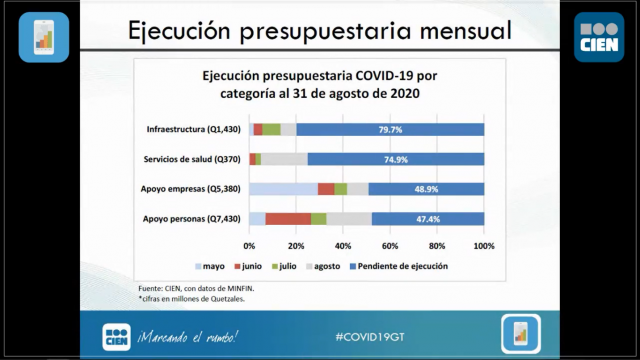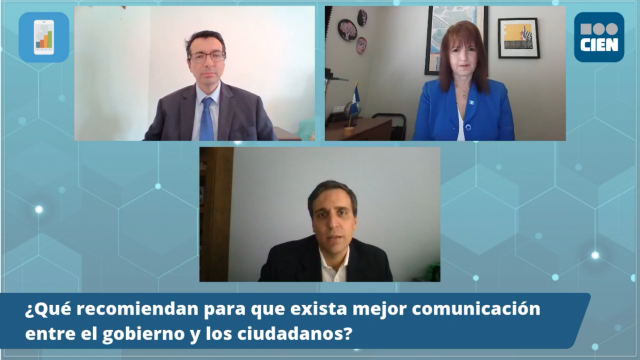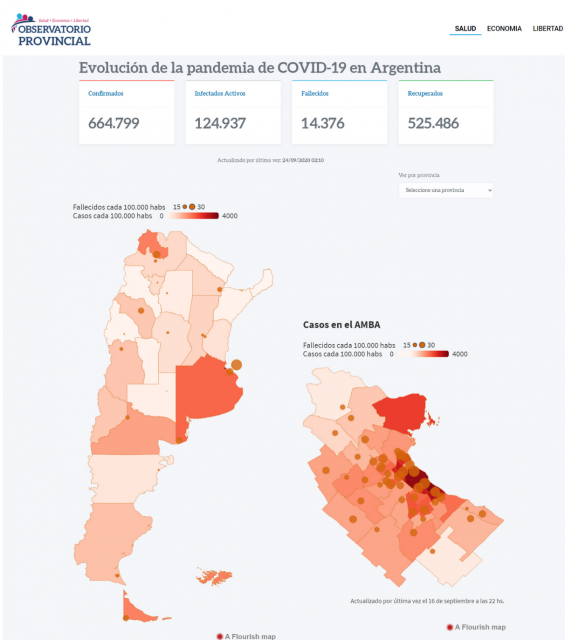The perennial challenges in Latin America have only intensified since the onslaught of the coronavirus pandemic. Analyses of the weak democratic institutions, corruption in public health and social security systems, and vulnerability of labor markets with high levels of informality, detail the impact and the continuing threat COVID-19 poses to a region already fraught with instability and uncertainty.
The lack of government transparency in many countries has only increased concerns of citizens and onlookers. In this situation, think tanks have played a role as leaders in civil society: to leverage their research skills and knowledge to provide better understanding of the dynamics amid the pandemic. These organizations are engaging in the discussions around policy approaches to establish accountability now and identify routes toward better outcomes.
CIPE is working with think tanks seeking to understand how COVID-19 has changed social and economic situations in the region, and how responses, from the public and private sector, can mitigate the pandemic’s damage.
Guatemala: COVID-19 Observatory and digitalization efforts
The National Economic Research Center in Guatemala, CIEN, has worked with CIPE to address government accountability and transparency throughout the last five years. Since the start of the pandemic, CIEN has shifted its work to generate understanding of the public health crisis and promote data-driven recommendations for public consideration.

During the first months of confinement, CIEN’s researchers produced three papers analyzing results of international responses to COVID-19; outlining Guatemala’s initial policy actions; and formulating near- and long-term proposals to mitigate the negative impact of the pandemic. The presentations of these initial investigations broadened the discussion of the government’s approach to confronting COVID-19, with the engagement of the media, private citizens, and public officials.
To maintain the momentum, CIEN has taken a dual approach of monitoring and advising government actions. On the monitoring side, CIEN launched an Observatory to detail the expenses of Guatemala’s ten COVID-19-response programs. In this initial webinar, CIEN detailed the discrepancies in spending across the programs and challenges to implementation with the goal of providing routine updates to promote the government’s fulfillment of policies and facilitate knowledge among the general public.
A recording of the launch of the COVID-19 Observatory can be viewed here.

Looking forward to Guatemala’s long-term response to the pandemic, CIEN will provide technical expertise to the Commission on Open and Electronic Government. From their initial investigations, CIEN found that technology aided in government responses and engagement with citizens during the pandemic. Speaking at the Virtual Latin America Think Tank Summit, Maria del Carmen Aceña, Vice President of CIEN, noted, “if we want the government to be efficient, effective and transparent, but above all, to be at the service of citizens, we must implement this vision of digital government.” This initiative will support the creation of a roadmap for expanding digital government services, promoting open data, and pushing the Guatemalan government toward an accessible, digital future.
Argentina: Provincial Observatory and SME trainings
Fundación Libertad, a think tank in Argentina working to improve private sector-led economic development and strengthen socioeconomic public policies, has also shifted its efforts to find solutions to the pandemic. Their COVID-19 response has taken two tracks: 1) the creation of a provincial observatory to track implemented restrictions and critical indicators across Argentina, and 2) a program of tailored training modules for small and medium enterprises (SMEs) called Pais PyME to address the need for digital literacy in business. These two initiatives seek to bring attention to the consequences of the pandemic and consequent restrictions while also provide timely support to vulnerable sectors of the Argentine economy.
The provincial observatory aims to provide updated data on health, economic, and personal liberty indicators for the 23 provinces and autonomous region of Buenos Aires of the country. By publicizing this data, Fundación Libertad can monitor the pandemic’s course to increase gaps in reporting from the National Health Ministry. The analysis provided also keeps the public and authorities at the national and local level informed of outcomes in relation to implemented policies.

The geographic representation of COVID-19 cases depicted in Fundación Libertad’s Provincial Observatory.
In expanding its audience, Fundación Libertad has begun a weekly YouTube series to share further discussion on the economic and personal liberties trends as impacted by COVID-19, with additional webinars with their staff and policy makers.
In addition, the Pais PyME (pequeñas y medianas empresas) modules expand the reach into the private sector to address the needs of SMEs in surviving the economic downturn. The modules provide strategies and information for cross-sector SMEs, for strengthening their businesses and navigating the present challenges. Ricardo González, a facilitator in the trainings commented that “the context is very bad economically and financially, but there are still companies that are committed to training to face the future.”
Thus far, the trainings have reached 1,322 businesses across 13 provinces with topics from human resource management, fundamental financial and investment concepts, and leadership in business, to modules on Microsoft Excel and marketing in a digital context. These trainings provide the skills and knowledge necessary for SMEs to strategize on maintain their businesses in this complex economic environment.
With a total of 45 modules between now and the end of the year, the Pais PyME project will reach a greater number of businesses, forming a network of entrepreneurs who have participated in the expanded webinars Fundación Libertad has produced.
By bringing in experts from the private sector to complement their staff, Fundación Libertad leverages its network and understanding of the highest priorities for SMEs to drive the recovery from the pandemic. With the right tools and knowhow, SMEs are poised to lead economic revitalization.
As Latin America and world continue through the pandemic, learning how to balance public health measures with economic reopening will require data-informed strategies and transparency to prevent further outbreaks and put countries on the path to recovery.
CIPE’s think tank partners are leading the charge in making sense of the crisis and shifting the dialogue from trying to get back to a pre-COVID-19 life and instead chart a better way forward.
Published Date: September 24, 2020
